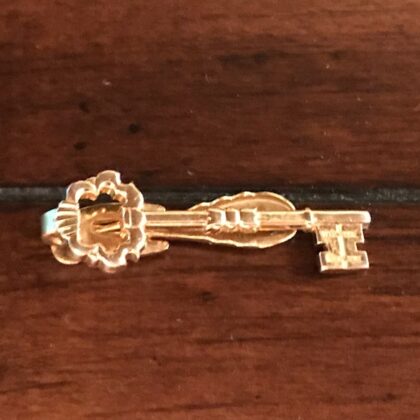Tie Clip
On my personal altar, I have a tie clip in the shape of a key. It belonged to my grandfather. In a way, it represents reconciliation, which often requires some courage.
When I was growing up, I thought my grandfather was the epitome of serenity. As he neared the end of his life, I became more aware of parts of his story I hadn’t known before. Rather than seeing him as serene, I began to see him as someone who had allowed other people to determine every major decision in his life. I felt betrayed in a strange way.
After he died, I was reluctant to keep learning about his life. I didn’t want to be further disappointed. He had been a role model for me in many ways, and my image of him had unraveled. It didn’t seem mendable once he was gone.
The feeling of disappointment and betrayal didn’t go away, though. I tried to lock away the painful emotions and avoid dealing with them, but he had been such an important part of my life that he was hard to dismiss.
So, I sat him down in front of me one day in my mind, and I told him, “I thought you were so amazing, and then I discovered you were this passive person who never took responsibility for your own life.” He replied (in my imagination), “I didn’t think I had a choice. I was afraid to disappoint people. I was afraid to disappoint God. I’m sorry I’m not the person you thought I was.”
And I told him all of things he had done for me. All of the ways he had made a difference in my life. All of the times he had cared for me when no one else in my family was really there. And I forgave him for being less than perfect.
In that posthumous conversation, we were reconciled. Our relationship now is not what it was when he was alive, but it isn’t a source of pain.
For all of his passivity, my grandfather still accomplished some incredible things. I wonder what opportunities or dreams he avoided because he was afraid others wouldn’t approve. I also wonder if he was perfectly content just as he was. My judgment against him was a lot more about my own expectations than it was about anything he actually said or did.
As we explore the theme of courage this month, we conclude with a ceremony honoring our ancestors. A lot of human cultures do that this time of year. Honoring your ancestors may come easily to you. Or maybe you’ve already done a lot of work to be at peace with them.
For a lot of us, though, it requires some courage for us to acknowledge who our ancestors were, forgive them for whatever harm they caused—intentionally or unintentionally—and celebrate the gifts we received from them. There are lots of things about our ancestors we might want to avoid acknowledging. But healing and reconciliation become possible when we are willing to bring those things into the light.
What stands between you and your ancestors? Where is there room for you to forgive them? What gifts from them might you celebrate more fully?
Share this post:
